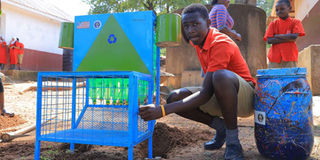Project to help city schools manage waste

A pupil shows off the multipurpose dustbins that also work as classroom chairs. Photo | Edgar R. Batte
What you need to know:
- The school is one of six school in Kampala that are benefitting from the project. The other schools are St Ponsiano Kyamula Primary School, Kawempe Muslim Primary School, Namirembe Infants School and Luzira Church of Uganda School, all in Kampala.
Our air is filled with a lot of particles both large and small. With the teeming activity in the city, the air is likely to be polluted with backyard burning of trash, fire embers, dust, grass cuttings or spray paint, to vehicle exhaust, pollen, perfume or cigarette smoke and other much smaller particles. These elements can do a lot of damage to health over time. One of the most effective ways to improve air quality therefore is proper waste management.
“We have been experiencing the challenge of waste management. Many of the city dwellers, including street children, jump over the school fence and dump rubbish. That, in addition to our internally generated waste, becomes a burden to us. However, with the new ‘Clean Air Project’ innovation, we are building a new waste management pit where we separate degradable and non-degradable waste,” explains James Wonyaka, the head teacher of Bat Valley Primary School.
The school is one of six school in Kampala that are benefitting from the project. The other schools are St Ponsiano Kyamula Primary School, Kawempe Muslim Primary School, Namirembe Infants School and Luzira Church of Uganda School, all in Kampala.
The project is being implemented by a group of 11 that were sponsored by the United States Embassy in 2018 to visit and learn what the country was doing in terms of air quality monitoring.
Emily Namanya, a sanitation and environment projects coordinator at Kampala Capital City Authority (KCCA) is one of the beneficiaries of the exchange programme to the US dubbed ‘Alumni Engagement Innovation Fund (AEIF). On return, Namanya and her colleagues started the ‘Clean Air Project’ with logistical support of a grant from the embassy. They bought low cost motion sensors to measure the level of pollution in Kampala city that were placed in strategic places of the city. The group chose to work with schools that were associated with KCCA.
Global concern
Among the various pollution problems, air pollution has caused major concern over the world due to its widespread nature, damage to our environment and potential health risk to humans. According to the 2018 World Air Quality Report undertaken by AirVisual, Kampala is ranked as the city with the second worst air in Africa. The mortality rate for air pollution in Uganda was placed at 155.7 for every 100,000 in 2016.
Kampala City, generates 750 tons of waste a day. About half of it ends up at dumpsites. The rest is carelessly dumped in different community spaces, including water channels.
In 2018, World Health Organization (WHO), estimated that 13,416 people in Uganda die from air pollution illnesses or conditions worsened by exposure to air pollution (WHO, 2018). Of these deaths, 94 per cent are due to noncommunicable diseases - notably cardiovascular disease, stroke, chronic obstructive pulmonary disease, and lung cancer.
Globally, 92 per cent of the world’s people breathe outdoor air that’s polluted beyond levels deemed acceptable under WHO guidelines.
How it is done
At the pilot schools, waste collection is spearheaded by ‘eco clubs’ composed of pupils and teachers under the Eco Action Uganda, an implementing non-government organisation that focuses on responsible citizenry co-existence with the environment by ridding communities of waste.
Its director, Reagan Kandole explains that they provided multipurpose metallic waste bins which pupils can use as seats as well as disposal of plastic bottles and more. They also started collecting this plastic and metallic waste from communities that they used to make colourful dustbins.
“We managed to clean up to two tons of junk metal,” he reveals. Each school got 20 dustbins and followed this up with sensitisation and training of pupils and teachers as implementers of the clean air project.
Teachers from the six schools were recently taken through a training at Bat Valley Primary School with the objective of engaging them to learn and appreciate the sustainable ideas of Reduce, Reuse and Recycle (RRR).
This innovation in waste management allows one to use it profitably rather than burning it. Kandole is hopeful that such innovations will help reduce illegal dumping sites which pollute the soil and block drainage channels in Kampala.
Each school is expected to set up a demonstration garden with the aim of using the degradable waste with the intention of turning it into organic manure.
This, Namanya says, will go a long way in promoting urban agriculture. “Since teachers learn fast and can teach others, they are ideal for this project. We have trained them in ways to start them up using spaces provides by schools,” she says.
At a global level, more than 300 million tons of plastic waste is registered, 50 per cent of which is for single-use purposes. Pollution is one of the leading preventable causes of death around the world.
There are plans to replicate this initiative in other parts of the country.





